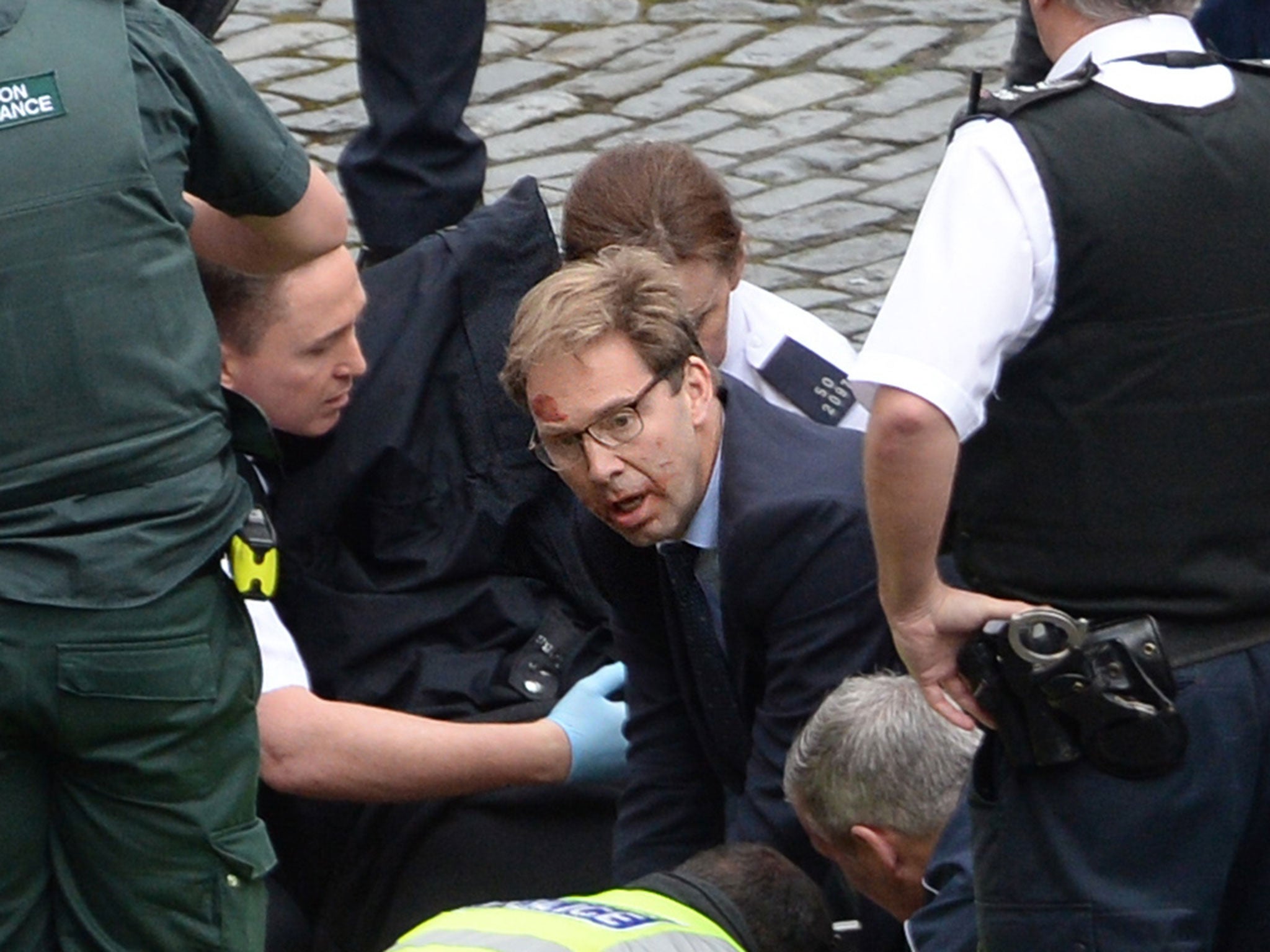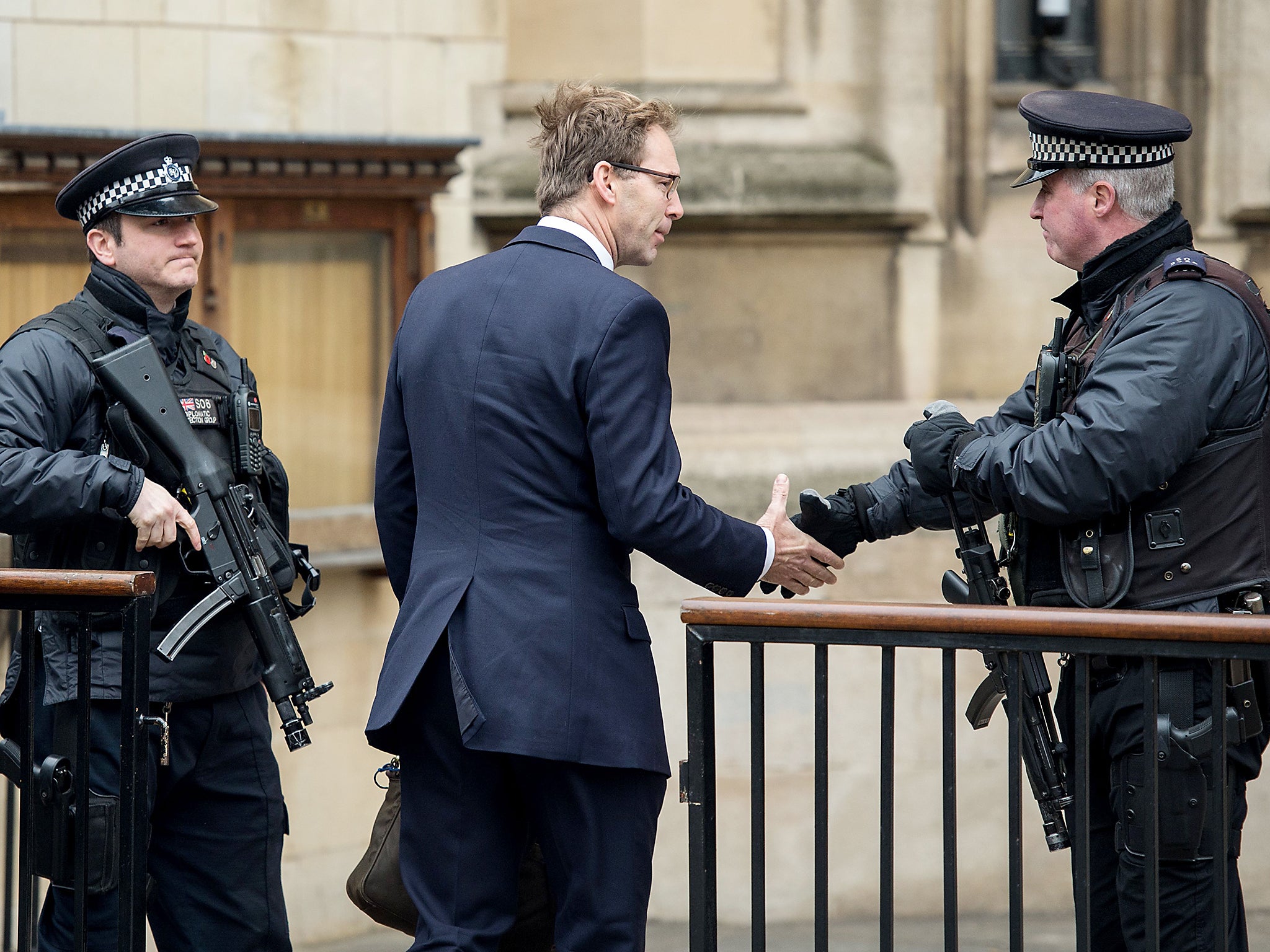MP who tried to save PC Keith Palmer's life in Westminster terror says public should 'step forward' during attacks
'I closed his eyes and said "I'm sorry," defence minister tells Westminster attack inquests

An MP who tried to save PC Keith Palmer’s life after the Westminster attack has said members of the public should “step forward” during terrorist atrocities.
Tobias Ellwood, a defence minister and former soldier, told the Old Bailey how he ran towards the scene as people ran screaming in March last year.
“I know the official advice is to step back, report it,” Mr Ellwood told the inquests into the deaths of Khalid Masood’s five victims.
“I find myself countering that somewhat, because if more of us do step forward as we saw in the Manchester attack, London Bridge and Westminster Bridge as well, the message gets through that no terrorist is going to win.”
Mr Ellwood said he would have been behind Masood as he launched the attack if he had taken his usual route to parliament.
“I know I would have stepped forward and I regret not having the opportunity to do so,” he added.
Police advise members of the public to “run, hide, tell” in the event of a terror attack in Britain, in contrast to the US protocol of “run, hide, fight”.
“Run to a place of safety,” reads advice from National Counterterrorism Policing Network. “It is better to hide than to confront.”

A senior counterterrorism police officer previously told The Independent that have-a-go heroes could inadvertently hinder the response to attacks, making it more difficult for armed officers to identify threats and “know who to shoot”.
A National Police Chiefs’ Council spokesperson said: “The core advice will always remain the same: in the event of a gun or knife terror attack – run, hide, tell.
“However, if someone is in immediate danger and their life is being threatened we would never criticise their actions if instinct takes over and they feel the need to fight back, or step in to try and assist an injured person.”
The Westminster inquests will examine the security arrangements at Westminster Bridge and the Houses of Parliament, police training and body armour, and what security services knew of Masood.
The court heard there was no permanent post for firearms officers at Carriage Gates entrance when the attack took place, and that those assigned to guard the palace yard were on mobile patrol.
PC Palmer was armed only with CS spray and a truncheon as he guarded the entrance, with distressing footage played to the inquest showing him falling to the ground as he backed away from Masood and being stabbed multiple times.
He managed to get up and run a short distance when the terrorist was briefly distracted by his colleagues, but collapsed and died at the scene.
Mr Ellwood was among the people who performed first aid on the Metropolitan Police officer, with a photograph showing the MP giving CPR with blood on his face.
The former soldier told the inquests that he feared Masood may have left a bomb in his crashed car as he ran towards parliament, after his own brother was killed in a secondary attack during the 2002 Bali bombings.
Mr Ellwood first became aware that something was wrong when he heard a “significant crash” followed by “screams” before waves of people started running through underground passageways away from parliament.
“They were shouting, ‘go, go, go, go’ and ‘go back, go back’,” he said
“I was concerned about what would happen if things were to ratchet up, but my immediate concern was that we had somebody who was clearly badly bleeding and needed assistance.”
The minister described seeing several armed police officer pointing their weapons towards Carriage Gates and two men on the ground – PC Palmer and Masood.
Mr Ellwood said he stepped forward, making clear who he was to the armed officers.
“I said, ‘I’m medically trained, can I help?’ I recall one of them saying, ‘tell us what to do’,” he added.
“Immediately I started going through the drills to provide the necessary first aid support to the officer.”
The MP said PC Palmer had lost a lot of blood and appeared pale, but had a pulse although his wounds, particularly one underneath his left arm, were significant.
“He had lost a huge amount of blood,” he added. “Eventually his heart stopped as did his breathing, and that’s when I commenced CPR.”
Mr Ellwood said there was a “sense of relief” when paramedics and doctors from the air ambulance arrived.
Becoming emotional as he recalled medics opening PC Palmer’s chest to perform emergency surgery, he said: “Forgive me, it’s sometimes easier to do the helping rather than to talk about it afterwards.”

When it became clear that the officer would not survive, Mr Ellwood told a doctor present: “You’re going to have to order me to stop.”
“Sir, you’ve done your best but you do need to stop,” the medic replied.
He described the “eerie silence” after PC Palmer was pronounced dead at 3.15pm and Westminster remained on lockdown.
“We both covered the body as best we could, closed the eyes and I said: ‘I’m sorry’,” he recalled.
“It was very, very silent, it was a very strange end to a very traumatic four or five minutes, to suddenly be left completely alone with just one other person.”
Dr Antony Hudson, from the London Air Ambulance, said he arrived to find PC Palmer in cardiac arrest.
Despite giving the 48-year-old a blood transfusion and operating on his open chest as he lay on the ground, he said it was “impossible to return a cardiac output”.
Masood targeted PC Palmer after killing Kurt Cochran, 54, Leslie Rhodes, 75, Aysha Frade, 44, and Andreea Cristea, 31, when he ploughed an SUV into pedestrians on Westminster Bridge.
The 52-year-old crashed the car into railings surrounding the Houses of Parliament and then ran round the boundary into Carriage Gates, threatening members of the public as they fled.
Plain clothed close protection officers were the first armed police to respond to the attack, shooting Masood in the chest when he refused to drop his knives.
Mr Ellwood told the Old Bailey that before the attack, there had at times been less firearms protection at the site than he would have liked, but now “the level of security we have in place, I’m not sure we could do more”.
The Westminster incident was the first attack claimed by Isis in the UK, being followed by four more terror incidents over the coming months.
An inquest into Masood’s death will be held at a later date – separately from those of his victims.
Additional reporting by PA
Bookmark popover
Removed from bookmarks